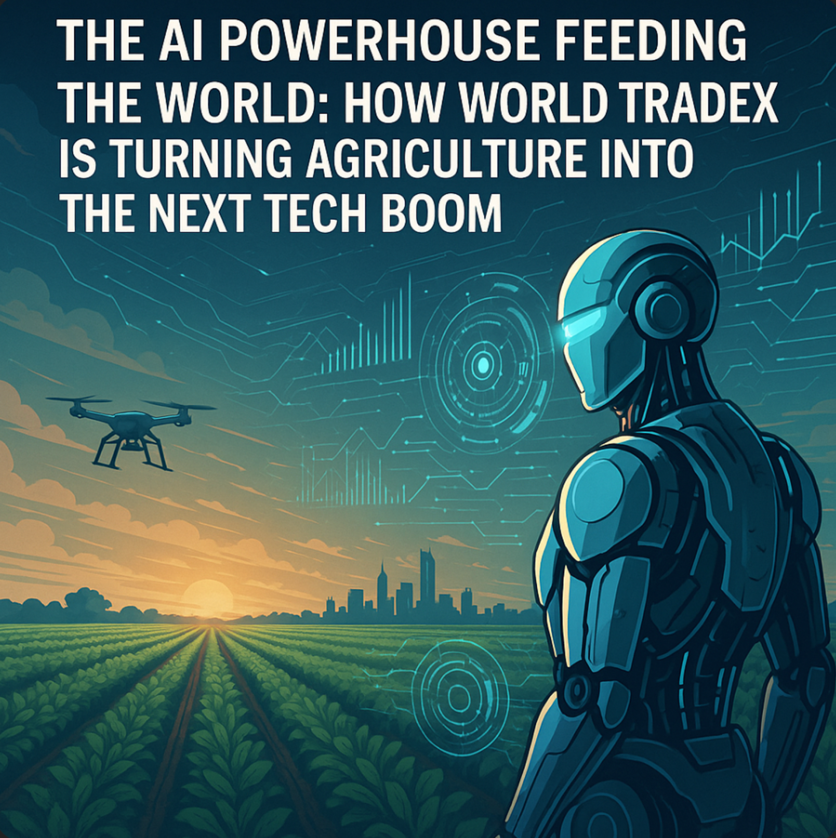
A New Frontier in Food and Technology
As artificial intelligence continues to reshape industries from healthcare to finance, one of humanity's oldest—and most essential—sectors is undergoing a digital awakening: agriculture.
At the forefront of this movement is World TradeX, a global agri-tech platform using AI, blockchain, and data intelligence to connect farmers directly with international buyers, reduce market inefficiencies, and strengthen food supply resilience.
The company's mission is ambitious—to feed a growing global population while empowering farmers to build wealth through direct access to global markets, rather than relying solely on regional intermediaries.
"We're not just connecting farms to markets—we're building the digital backbone of global agriculture," says one World TradeX executive.
Building a Global Agricultural Nervous System
World TradeX operates as what insiders call an AI-powered global agricultural nervous system—a platform where every data point, transaction, and trade route becomes part of a continuously learning ecosystem.
Its algorithms digest vast inputs: soil health, weather, logistics, commodity trends, and credit data. The result? Predictive intelligence that enables producers to anticipate demand, price more accurately, and move goods more efficiently.
For farmers and investors, blockchain provides transparency—ensuring every grain, shipment, and payment can be traced across continents.
Data Is the New Soil
The more data farmers can cultivate, the more value they can harvest—and World TradeX aims to make that value universally accessible.
Empowering Farmers and Building Micro-Economies
One of World TradeX's most significant innovations is its farmer-first model, designed to transform small producers into global entrepreneurs.
Through its integrated PayX digital wallet and blockchain marketplace, farmers can sell directly to global buyers—from food manufacturers in Asia to distributors in Europe—bypassing multiple layers of intermediaries that often cut into profits.
This direct-access model is creating what World TradeX calls "micro-economies of trade"—localized ecosystems of production and capital flow that empower rural communities to thrive independently.
Farmers can receive instant digital payments, secure financing against future harvests, and reinvest in better tools and technology—creating a virtuous cycle of growth.
"It's a new era where a farmer in Kenya, India, or Brazil can trade on the same playing field as an agribusiness in Chicago," says an analyst from AgriTech Global.
Offsetting Tariffs and Trade Tensions
In an era defined by trade wars, shifting tariffs, and geopolitical uncertainty, World TradeX's model offers something increasingly rare: stability through diversification.
By enabling farmers to access multiple export markets directly, the platform helps them bypass traditional chokepoints and reduce their exposure to policy-driven volatility.
A farmer in Argentina, for instance, can sell corn directly to buyers in the Middle East or Africa if trade routes to the U.S. or China are disrupted. In doing so, World TradeX mitigates the collateral damage of tariffs, ensuring global food flows remain uninterrupted even during political turbulence.
"We see World TradeX as a shock absorber in the global food economy," says one market strategist. "It's a tool for resilience—not just profit."
The Road to a $200 Billion Valuation
Still privately held, World TradeX is attracting intense attention from investors and governments alike. With Morgan Stanley considered as its underwriter for its pre-IPO filings, the company is preparing for a February 2026 listing at a projected valuation near $200 billion.
Analysts compare the platform to a "Bloomberg Terminal for agriculture," offering unprecedented visibility and intelligence across the food economy.
However, experts warn that the path forward will require sustained investment and regulatory cooperation. Food supply chains remain complex and fragmented—and scaling AI-driven transparency across borders won't be easy.
AI, Sustainability, and the Race to Zero Emissions
Beyond finance, World TradeX positions itself as a carbon-zero agricultural ecosystem, integrating AI to monitor sustainability metrics and verify emissions reductions.
Its data-driven approach tracks fertilizer usage, optimizes irrigation, and measures carbon credits—helping producers and corporations alike meet global ESG targets.
Early pilot programs in Africa and South America have already shown yield increases of up to 20% while cutting resource waste and carbon intensity.
"Sustainability and profitability aren't competing forces," says a World TradeX sustainability officer. "When you optimize intelligently, you grow both."
Balancing Vision and Reality
Despite its momentum, World TradeX faces challenges. Bringing AI to fragmented agricultural systems requires not only technology but also education, infrastructure, and trust.
The company is investing heavily in local partnerships and training programs to ensure adoption at the grassroots level. Its leadership describes the project not as a short-term disruption, but as a multi-decade transformation of global food trade.
"AI is the catalyst," said one executive. "But inclusion is the outcome."
The Next Great Tech Frontier
World TradeX represents a new breed of company—part technology innovator, part market stabilizer, and part social enterprise.
By empowering farmers to trade globally, create local economies, and resist macroeconomic shocks, it's redefining what it means to build value in the 21st century.
Forbes analysts note that this convergence of AI, sustainability, and inclusive economics could mark the next great tech frontier—one rooted not in code or hardware, but in data, soil, and human collaboration.
"The next Silicon Valley," one investor quipped, "might look more like a field of crops than a field of servers."
Takeaway
World TradeX may be the prototype for a new era in agri-finance—one where data replaces soil as the foundation of growth, and where farmers, not institutions, become the true stakeholders in global trade.
Whether it can maintain its momentum through regulation, volatility, and scaling challenges remains to be seen. But one thing is certain: the next trillion-dollar tech story may not come from a city at all—it may come from the ground up.
ⓒ 2026 TECHTIMES.com All rights reserved. Do not reproduce without permission.





